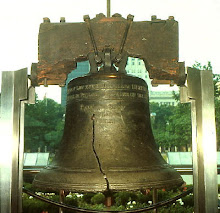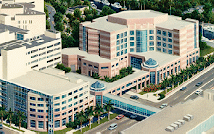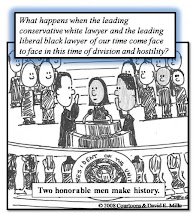
In unusually harsh words, Miami-Dade Circuit Judge Betty Butchko blasted the flaws of the system that defends the indigent accused of third-degree felonies, the Miami Herald reported last week in a story by David Ovalle.
Here is that story, my comments follow.
Angered by a flood of cases and overworked lawyers in her court, a Miami judge on Friday blasted the state's system designed to defend poor people accused of crimes.
''We're not in some Third-World nation where the Constitution means nothing. In this division, the Constitution means something,'' Miami-Dade Circuit Judge Betty Butchko told lawyers Friday.
Her unusually sharp words came during a hearing to assign a new lawyer for an accused car thief whose original assistant public defender, citing a swollen caseload, announced she was unprepared for trial.
Butchko's criticism comes as an appeals court weighs whether the Miami-Dade Public Defender's Office can decline new third-degree felony cases because of its thinned ranks and underfunded budget.
''I do not have the luxury to wait. Justice is not stayed pending a ruling,'' Butchko said Friday of the ongoing appeal.
The public defender's office, with about 183 lawyers, represents poor defendants who can't afford to hire private attorneys. Last June, the office sought to decline all new noncapital felony cases.
In September, Miami-Dade Circuit Judge Stanford Blake ruled the office could refuse new third-degree felonies, a move critics say will cost taxpayers more down the road.
The Third District Court of Appeal put Blake's decision on hold while it mulls an appeal by state prosecutors. They say his ruling violates state law and Martinez hasn't proved the indigent get poor legal help.
In January, assistant public defenders began delivering notices to clients saying cases would not be prompt because of the workload.
Also this week, Martinez's office announced 47 private attorneys -- with 1,070 years combined experience -- had agreed to take over one third-degree case each from his office for no pay.
The system, right now, works like this:
An indigent defendant has their case assigned to the public defender's office. If Martinez's lawyers have a conflict -- say, a witness is also represented by the public defenders in another case -- the client is assigned to the state-funded Regional Counsel office.
If that office also has a conflict, private lawyers with state contracts are assigned to the cases.
Friday's drama revolved around Mario Escoto, 27, arrested in January for third-degree grand theft auto.
This week, as his case neared trial, his lawyer, assistant public defender Karen O'Connor, asked for more time to prepare because she was juggling too many clients.
Frustrated, Judge Butchko removed her from Escoto's case, citing ''ineffective counsel.'' She appointed a private attorney, bypassing Regional Counsel -- which the judge also called stretched thin and overburdened. The decision drew immediate criticism.
State officials refused to pay a private attorney because Regional Counsel had not been assigned the case first.
Richard Joyce, the Regional Counsel's chief assistant, blasted Butchko for unfairly assuming his office could not handle a glut of third-degree felonies cases.
He accused the judge of micromanaging his office.
Butchko finally agreed Friday afternoon to assign the case to Regional Counsel, which employs lawyer Annette Gomez to the judge's courtroom for 30 hours a week. ''I'm not micromanaging,'' Butchko said. ``I want to make sure she can handle the cases.''
HERE IS WHAT I THINK ABOUT THE WHOLE DAMN THING
First, defense attorneys, prosecutors, and judges should issue a joint proclamation that the regional office of conflict counsel has been an abject failure from the outset. It was never intended to advance the rights of defendants, but just to cut the costs of the state. No matter how well intended the lawyers who serve the office, the system was ill-conceived, poorly planned, and woefully underbudgeted. The lobbyists that spend so much time lining their pockets with county funds ought to volunteer their time to convince our dumb legislature that the mechanism we have set up is an administrative nightmare and constitutional abomination. Some groups have to effectively start saying so and loudly.
Second, private lawyers volunteering to handle the overload is noble and laudatory but simultaneously plays into the hands of legislators trying to escape their fiscal and fiduciary responsibilities to provide indigent persons counsel under some case called, oh, I don't know Gideon. Third, any half ass stop gap measures which perpetuate a newly designed system that is already doomed to failure is only surely going to perpetuate injustice, not resolve it. Public Defenders need more public funding and it has to come, pursuant to Article V of our Constitution from the State, and they collectively should sue to get it if they have to.
From the FACDL to the Bar Associations to the judges, a statewide initiative needs to slap the legislature in the face and suggest we cannot have multi county regional offices in Miami representing clients hundreds of miles away, and the system we set up was monetary in purpose, greedy in nature, and fundamentally unfair to the poor, or business as usual for the Florida legislature. At the same time, they need to say if Florida is going to keep on passing more laws to put people away, they are going to have to find funds for more lawyers to represent the accused.
It goes beyond this article above and the lawsuits about who should handle third degree felonies. No the system we had was not perfect, and the wheel did not always turn justly, and judges too often made special appointments a gravy train for their buddies, but like Slattery's People, an old TV show, once said, 'the other systems are a lot worse.' We took a bad situation and made it worse, and now we have to just crawl out of the swamp to get into the mud. But we ought to start, and unfortunately this legislative session is moving to an end with the Office of Conflict Counsel in place, and the only thing it has placed is more conflict in the courts then we ever needed.
With all the judicial review going on over who should pay for what, cases are delayed, justice is denied, victims are rendered impotent, the accused are denied effective counsel, lawyers who should be representing indigents willingly are reluctantly wasting time in court fighting about it, and the entire public is screwed over permanently.
How badly are we screwing over ourselves, our system, and our dignity? How badly do we need a statewide commission to review crimes, sentencing, judges, representation, and the entire system of justice that is so unjust? But let's have another one of the wonderful groups of lawyers that represent the Bar Associations celebrate some more judges at the Tower Club instead of holding weekly seminars exposing the flaws that cripple us daily. What a joke we have become.
Like Anatole France wrote, "The law, in its majestic equality, permits the rich as well as the poor to sleep under bridges..." Hey, how about making the judges wait on line to get in the courthouse. How about a judicial luncheon under a bridge where sexual offenders sleep? How about a public hearing held by the chief judge allowing citizens to come in and complain about courthouse parking, case delays or how when they get subpoenaed for a traffic ticket they lose a day's pay, the county pays them $6.50 for the summons, and it costs $9 an hour to park in the lot? How about asking why civil judges have 4.000 cases? Do we really need to tour the mental ward of the 9th floor in the Dade County Jail two years after lawsuits were filed to show how shoddy, shabby and shameful the conditions there are?
There is so much to be done, and this is just the legal system.
































No comments:
Post a Comment